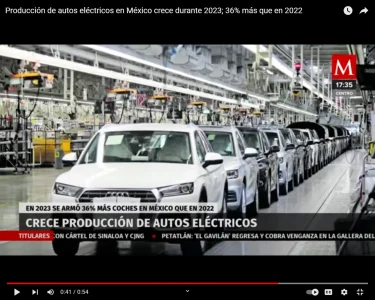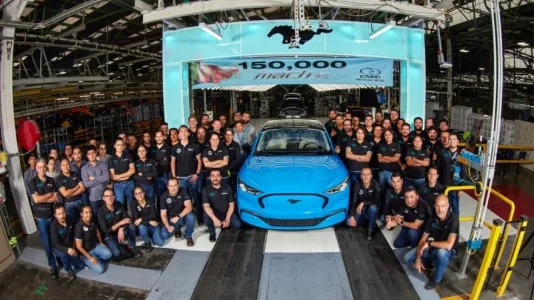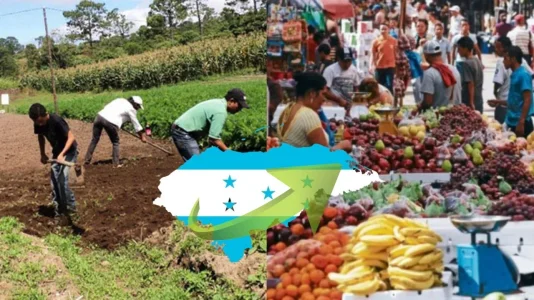President Claudia Sheinbaum has unveiled Plan México, a national initiative developed in collaboration with the private sector to fortify Mexico’s economic resilience and promote regional equity. This strategic roadmap
focuses on attracting private investment, fostering industrial growth, and creating hubs of social and economic prosperity aligned with the government’s well-being centers. Sheinbaum
describes the initiative as “a vision of equitable, sustainable development that prioritizes industrialization, economic growth, and above all, the well-being of Mexicans.”
A key objective of the plan is strengthening regional markets and reducing dependency on Asian imports, currently valued at over US$210 billion annually. “Plan México is our navigation chart for a transformative era,” states Marcelo Ebrard, Minister of Economy. He highlights the collaborative approach involving federal entities, state economic development secretaries, and private sector leaders. “Uncertainties lie ahead, but with cohesion and a strong national direction, we will overcome them,” he adds.
Key Objectives of Plan México
The
initiative outlines a robust, long-term framework designed to integrate Mexico into global value chains while addressing regional disparities. Core objectives include:
- Positioning Mexico among the Top 10 global economies by strengthening the domestic market and increasing international participation
- Maintaining investment as a percentage of GDP above 25% by 2026 and 28% by 2030
- Generating 1.5 million additional jobs in specialized manufacturing and strategic sectors
- Ensuring 50% of national consumption is sourced from Mexican suppliers in strategic sectors
- Increasing local content in global value chains by 15% in key industries such as automotive, aerospace, electronics, semiconductors, pharmaceuticals, and chemicals
- Directing 50% of public procurement toward national production, leveraging public purchasing as a development tool
- Manufacturing vaccines in Mexico, advancing complete pharmaceutical production processes, local packaging, and focusing on advanced biotechnology
- Reducing the total time to finalize an investment from 2.6 years to 1 year, with 50% fewer procedures using a unified digital investment portal
- Training 150,000 professionals and technicians annually through continuous education programs aligned with strategic sectors and achieving 100% dual education in technical high schools
- Promoting investments with environmental, social, and governance (ESG) practices, emphasizing water reuse, clean energy, solid waste management, and community impact initiatives
- Ensuring 30% of SMEs have access to financing through collaboration between development and commercial banks to expand funding opportunities
- Becoming one of the Top 5 most-visited countries in the world
- Reducing poverty and inequality across the country
Action Plan for 2025
- Jan. 9: First session of the Advisory Council for Economic Development, Regional Growth, and Business Relocation
- Jan. 13: Presentation of the Mexico Plan
- Jan. 15: Monthly monitoring meeting to review the progress of the private investment portfolio and the development of 100 industrial parks
- Jan. 6–15: Start of tripartite collaboration (businesses, universities, government) on strategic projects, including Olinia, data centers, drones, the Mexican satellite launch, and biogenerics and biosimilars
- Jan. 17: Publication of the Relocation Decree to implement accelerated depreciation for new investments in fixed assets by global and Mexican companies, applicable until 2030
- Launch of the National Digital Investment Platform
- Publication of the National Law for Simplification and Digitalization
- Jan. 20–24: Working groups with importing companies to foster local and regional supply chains, including tariff alignment with North America
- Feb. 3–7: Launch of a Development Banking Fund to support MSMEs, suppliers, and exporters working with anchor companies
- Establishment of new energy consumption regulations and private participation schemes in energy generation
- Feb. 17–21: Relaunch of the “Made in Mexico” brand.
- Development of mixed investment schemes for infrastructure projects, aiming to tender projects requiring at least MX$100 billion in private investment
- Creation of a collaboration network for technical and ongoing curriculum training for secondary and high school education, with key players including the Ministry of Science, Humanities, Technology, and Innovation, the Ministry of Economy, TecNM, IPN, UNAM, and the private sector
- Feb. 24–28: Publication of a decree establishing at least one development hub per industrial corridor with the same incentives as CIIT.
- Launch of the IMMEX 4.0 program.
- April 18–19: Signing of an agreement between Banxico, the Mexican Bank Association, and the federal government to increase PYME financing access by 3.5% annually.
Driving Industrial, Sustainable Growth
Plan México includes several strategies to foster industrial development and sustainability:
- Relocation Decree: Offering immediate deductions of 56–89% on new fixed asset investments, with higher percentages applied to investments in high-tech, research, and development sectors
- No Distinction applies equally to foreign and Mexican companies
- No discrimination by industry or sector
- Additional deduction of an extra 25% deduction on incremental expenses for training workers in collaboration with educational and research institutions
- In effect until October 2030
- Well-Being Hubs: Creating new industrial corridors with environmental and social impact assessments, fiscal incentives, and special customs regimes
- Legal framework establishes 12 CIIT Welfare Poles (PODEBIS), two Yucatan Poles, and five additional confined polygons
- Requirements include government land contributions, subject to environmental and social impact assessments
- Planning tools include a master plan and development programs.
- Legal Certainty: Includes fiscal incentives, a special customs regime, and a single digital window for streamlined processes
- IMMEX 4.0: Consolidate the process for the current VAT and IEPS Certification with the procedure for the new Export Manufacturing Program 4.0 within the Ministry of Finance
- Reduces the startup time for new businesses by 50%
- Development Banking
- Reverse Factoring Flow: The bank assesses the risk of the anchor company, not the MSME, which sells between US$100 and US$500 million annually, depending on the sector.
- The MSME supplier registry is linked to the anchor company.
- Design of supply chains for scale and specialization
Well-Development Hubs Distribution Per Industry
According to the Plan México, Well-Development Hubs have been distributed according to their main industry focus in the following regions:
- Border Region – 300ha, Nuevo Laredo: semiconductors, consumer goods, automotive, and electromobility
- Gulf of California – 555ha, Hermosillo: energy, pharmaceuticals and medical devices, chemicals, and petrochemicals
- North – AHMSA 740ha; Binational Park Piedras Negras 300ha: aerospace, consumer goods, automotive and electromobility, agribusiness, textiles and footwear, energy, pharmaceuticals and medical devices, chemicals, and petrochemicals
- Durango – 470ha: energy and consumer goods
- Northwest – Sonora Plan: energy, automotive and electromobility, semiconductors, consumer goods, and aerospace
- Bajio – 52ha, Celaya: automotive and electromobility, consumer goods, textiles and footwear, and agribusiness
- Pacific – 608ha, Lazaro Cardenas Port: agribusiness, textiles and footwear, pharmaceuticals and medical devices, consumer goods, automotive and electromobility, semiconductors, and chemicals and petrochemicals
- AIFA – 300ha, Tula: aerospace, agribusiness, pharmaceuticals and medical devices, textiles and footwear, energy, chemicals, and petrochemicals
- Center – 462ha, Puebla: automotive and electromobility, agribusiness, textiles and footwear, energy, aerospace, chemicals and petrochemicals, and consumer goods
- Gulf – 935ha, dry port in Tamaulipas: energy, agribusiness, consumer goods, and aerospace
- Isthmus – 12 development hubs: energy, agribusiness, and consumer goods
- Maya – 223ha, Merida and Progreso: energy, agribusiness, and aerospace
Public Investment in Infrastructure:
A MX$115 billion (US$5.55 billion) investment for 1,980km of road interventions, including critical highways and regional connectors is also considered in the plan. Projects include over 5,600km of passenger rail projects, creating 3.6 million jobs and boosting connectivity across 24 states. Investment is divided as such:
- Cuautla-Tlapa-Marquelia: MX$13.5 billion - 264km
- Pachuca-Huejutla-Tamazunchale: MX$6.6 billion - 97km
- Bavispe-Nuevo Casas Grandes: MX$ 1.8 billion - 69km
- Tierra y Libertad Circuit: MX$124 million - 7km
- Toluca-Zihuatanejo: MX$18.5 billion - 317km
- Salina Cruz-Zihuatanejo: MX$28.2 billion - 478km
- Macuspana-Escarcega: MX$11.1 billion - 130km
- Ciudad Valles-Tampico: MX$6.3 billion - 68km
- Transpeninsular: Tijuana-Ensenada, By-Pass: MX$3.5 billion - 24km
- Saltillo-Monclova: MX$7.7 billion - 179km
- Guaymas-Esperanza-Yecora-Chihuahua: MX$18.1 billion - 347km
The main goal is to develop these enhancements during the 2025-2030 period, creating 347,972 jobs, 44,800km of conservation and 3,000km of rural roads.
Investment Plan:
Sheinbaum highlights that there is going to be a mixed investment plan to share risks and benefits between the public and private sectors in terms of passenger trains.
Passenger Train Plan Projects:
- 5,647km of railway
- MX$1.24 trillion investment
- 24 states covered
- 3.6 million jobs created
Key Routes:
- Mexico City – Nuevo Laredo
- Mexico City – Nogales
- Mexico City – Pachuca
- Mexico City – Queretaro
- Queretaro – Irapuato
- Saltillo – Nuevo Laredo
- Interoceanic Train, Line K
- Mayan Train (cargo)
Sheinbaum
had previously confirmed ongoing progress in passenger rail projects, including the Interoceanic Train and new routes such as Mexico–Nuevo Laredo and Mexico–Pachuca. Key road expansions, including the San Cristobal–Tuxtla Gutierrez and Mitla–Tehuantepec highways, are also set for completion. On the other hand, Mexicana de Aviación will receive new aircraft to enhance connectivity.
Water Project
In terms of water, Sheinbaum mentions that the main goal is to modernize irrigation systems in at least 50% of districts, securing water for increased food production and, primarily, for human consumption as a basic human right.
The main goals to be achieved include:
- 17 infrastructure projects benefiting 31 million people
- Sanitation of water bodies, particularly the Lerma-Santiago, Atoyac, and Tula rivers
- National Irrigation Modernization Program: modernization of 200,000ha of irrigated land, benefiting 225,000 producers
- US$20 billion public investment in water projects by 2025
- National Agreement for the Human Right to Water and Sustainability
- Over MX$21 billion in private investment
A decree will be issued to regularize concessions and allow the population access to subsidies, credits, and programs.
Strengthening Regional Markets and Innovation
The plan also prioritizes enhancing scientific and technological capabilities, with an emphasis on:
- Advanced biopharmaceutical manufacturing and vaccine production in Mexico
- Sustainable practices in energy, water reuse, and waste management
- Expanding access to financing for SMEs through innovative banking collaborations
Claudia Sheinbaum unveils Plan México, a national initiative to strengthen regional markets, attract investment, and drive industrial growth.

mexicobusiness.news


















